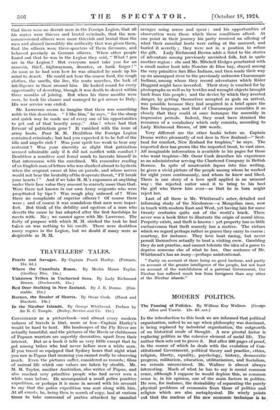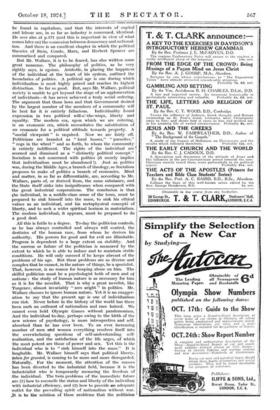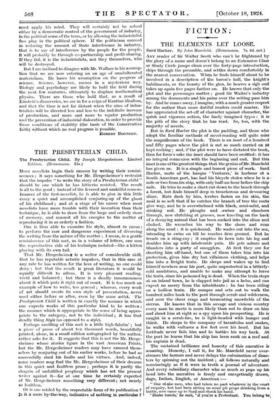MODERN POLITICS.
The Passing of Polities. By William Kay Wallace. (George Allen and Un.win. 12s. f3d. net.) IN the introduction to this book we are informed that political organization, suited to an age when philosophy was dominant, is being replaced by industrial organization,' the outgrowth of an historical mode of thought. A new pivotal factor is replacing politics as the cohesive element of social life. The author then sets out to prove it. But after 300 pages of proof, in the course of which he deals with the evolution of Con- stitutional Government, political theory and practice, ethics, religion, liberty, equality, psychology, history, democratic progress, militarism, education, utilitarianism, and Socialism, we remain unconvinced. Mr. Wallace is almost always interesting. Much of what he has to say is sound common sense, although I suppose he would deplore this, as common sense is, in his opinion, one of the main factors in politics. He sees, for instance, the desirability of separating the purely physical problems of economics from those of politics and religion which are also metaphysical. He wisely points out that the nucleus of the new economic technique is to*
be found in capitalism, and that the interests of capital and labour are, in so far as industry is concerned, identical. He sees also at p.171. (and this is important in view of what comes later on) the connexion between democracy and national- ism. And there is an excellent chapter in which the political theories of Stein, Comte, Marx, and Herbert Spencer are summarized and compared.
• But Mr. Wallace, it is to be feared, has also written some great nonsense. The philosophy of politics, as he very rightly says, is egoism. Aristotle, in placing the happiness of the individual at the heart of his system, outlined the boundaries of politics. A political age is one during which individualism is most highly prized and reaches its highest distinction. So far so good. But, says Mr. Wallace, political society is unable to get beyond the stage of an agglomeration of individuals—it has never achieved a truly social ordering. The argument that those laws and that Government desired by the largest number of the members of a community will be best for it is entirely fallacious. Individuality found expression in two political will-o'-the-wisps, liberty and equality. The modern era, upon which we are entering, is an economic era, which necessitates the substitution of an economic for a political attitude towards property. A "-social viewpoint" is required. Now we are fairly off. Politicians are branded as "local bosses," "parasites," "cogs in the wheel" and so forth, to whom the community is entirely indifferent. The rights of the individual are scorned and dismissed as a "distinctly political concept." Socialism is not concerned with politics (it merely implies that individualism must be abandoned !). Just as polities was, during the Middle Ages, a branch of theology, so Socialism proposes to make of politics a branch of economics. Mind and matter, in so far as differentiable, are, according to Mr. Wallace, parts of, or derived from, the same substance, and the State itself sinks into insignificance when compared with the great industrial corporations. The conclusion is that the individual, in a middle-class sense of the term, must be prepared to sink himself into the mass, to sink his ethical values as an individual, and his metaphysical concepti of liberty, and to seek a wider spiritual horizon in materialism. The modern individual, it appears, must be prepared to do a good deal.
All this is futile to a degree. To-day the politician controls, as he has always controlled and always will control, the destinies of the human race, from whom he derives his authority. His powers for good and for evil are illimitable. Progress is dependent to a large extent on stability. And the success or failure of the politician is measured by the extent to which he is able to induce and to maintain stable conditions. He will only succeed if he keeps abreast of the problems of his age. But these problems are so diverse and complex that he cannot, in the nature of things, be a specialist. That, however, is no reason for heaping abuse on him. The skilful politician must be a psychologist both of men and of nations : the study of human nature is as necessary for him as it is for the novelist. That is why a great novelist, like Turgenev, almost invariably "sees aright" in politics. Mr. Wallace chooses to ignore human nature. Yet it is no exagger- ation to say that the present age is one of individualism run riot. Never before in the history of the world has there been such an outburst of nationalism and race hatred. We cannot even hold Olympic Games without pandemonium. And the individual to-day, perhaps owing to the birth of the new science of psynhology, is more introspective and self_ absorbed than he has ever been. To an ever. increasing number of men and women everything resolves itself into the overwhelming questions of self-understanding, self- realization, and the satisfaction of the life urges, of which the most potent are those of power and sex. Yet this is the individual who is to "sink himself into the mass." It is laughable. Mr. Wallace himself says that political liberty, iaken for granted, is coming to be more and more disregarded. Naturally. For the moment, the attention of the masses has been diverted to the industrial field, because it is the industrialist who is temporarily menacing the freedom of .the individual. The twin problems of the 'immediate future , are (1) how to reconcile the status and liberty of the individual with industrial efficiency, and (2) how to provide en adequate -outlet for the prevailing spirit of nationalism without war. jt is to the solution of these problems that the politician must apply his mind. They will certainly not be solved either by a democratic control of the government of industry, In the political sense of the term, or by allowing the industrialist free play in the political sphere. If the politicians succeed in reducing the amount of State interference in industry, that is to say of interference by the people for the people, It will probably be through co-partnership and profit-sharing. If they fail, it is the industrialists, not they themselves, who will be destroyed.
But I am inclined to disagree with Mr. Wallace in his assump- tion that we are now entering on an age of unadulterated materialism. He bases his assumption on the progress of science. Science, however, moves in a mysterious way. Biology and psychology are likely to hold the field during the next few centuries, ultimately to displace mathematical physics. There are those who hold that, as a result of Einstein's discoveries, we are in for a reign of Kantian idealism, and that the time is not far distant when the aims of indus- trialists will be directed less and less to the indefinite increase of production, and more and more to regular production and the prevention of industrial dislocation, in order to provide those conditions of stability (the basis of the Conservative faith) without which no real progress is possible.
ROBERT BOOTHBY.




























































 Previous page
Previous page